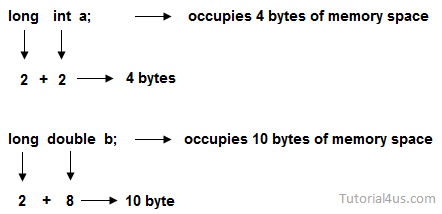Data type modifiers in C
In c language Data Type Modifiers are keywords used to change the properties of current properties of data type. Data type modifiers are classified into following types.
- long
- short
- unsigned
- signed
Modifiers are prefixed with basic data types to modify (either increase or decrease) the amount of storage space allocated to a variable.
For example, storage space for int data type is 4 byte for 32 bit processor. We can increase the range by using long int which is 8 byte. We can decrease the range by using short int which is 2 byte.
long:
This can be used to increased size of the current data type to 2 more bytes, which can be applied on int or double data types. For example int occupy 2 byte of memory if we use long with integer variable then it occupy 4 byte of memory.

Syntax
long a; --> by default which represent long int.
short
In general int data type occupies different memory spaces for a different operating system; to allocate fixed memory space short keyword can be used.
Syntax
short int a; --> occupies 2 bytes of memory space in every operating system.
unsigned
This keyword can be used to make the accepting values of a data type is positive data type.
Syntax
unsigned int a =100; // right unsigned int a=-100; // wrong
Signed
This keyword accepts both negative or positive value and this is default properties or data type modifiers for every data type.
Example
int a=10; // right int a=-10; // right signed int a=10; // right signed int a=-10; // right
Note: in real time no need to write signed keyword explicitly for any data type.
No comments:
Post a Comment